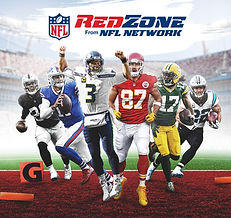
Fantasy Football

Watching the Game
Shift in View Habits
Before fantasy football became mainstream, most NFL fans primarily followed their favorite teams. They watched their local broadcasts and rooted for their team’s success. However, fantasy football has fundamentally changed how fans engage with the sport. Rather than watching just one team, fantasy managers monitor multiple games at once, tracking individual player performances rather than focusing solely on a team’s success. This has led to increased national viewership, with fans tuning into games they previously had no reason to watch.
Red Zone
Perhaps the most significant shift in football viewership came with the creation of NFL RedZone in 2009. Hosted by Scott Hanson, RedZone is a commercial-free channel that jumps from game to game, showing every touchdown and critical play as it happens.
For fantasy football players, RedZone is the ultimate viewing experience. Instead of watching a full-length game, which can sometimes be slow-paced, fantasy managers get constant action—every score, big catch, and highlight moment, all in real-time.
Scott Hanson

Scott Hanson is the host of NFL RedZone, a live broadcast that airs every Sunday during the NFL regular season. From 1:00 p.m. to approximately 8:00 p.m. Eastern Time, Hanson guides viewers through real-time coverage of all Sunday afternoon games, focusing on live look-ins when teams enter the "red zone"—the area within 20 yards of the end zone. The program is known for its "whip-around" style, switching between games to showcase every touchdown and significant play as they happen. Hanson's role requires intense focus and stamina, as he delivers continuous commentary without commercial breaks, often going the entire seven-hour broadcast without a bathroom break, thanks to a strict pre-show routine. His dynamic presentation and ability to seamlessly navigate multiple games have made NFL RedZone a favorite among football fans, especially those involved in fantasy leagues and sports betting.
NFL RedZone has been a massive success, significantly increasing engagement with the sport. It has also contributed to the decline in traditional cable viewership, as many fans now prefer RedZone over watching a single game.According to the 2014 Game Changer study, researchers traced the rise of RedZone to one thing: the explosion in fantasy football. Players weren’t just fans of teams anymore—they were managers of digital lineups scattered across the league. They needed to see everything: one RB on the Falcons, a WR on the Dolphins, a kicker on the Colts. RedZone delivered that in real time.
How Winning in Fantasy Changes How We Watch the NFL

Imagine this: It’s Sunday afternoon. You’re 7–2 on the season, sitting comfortably at the top of your fantasy league — but every matchup still matters. Your RB1 hasn’t played yet, and your playoff hopes hinge on staying hot. You’re glued to NFL RedZone, refreshing your phone every 30 seconds, flipping between games like your life depends on it. Sound familiar?
According to a 2011 study that followed 236 fantasy football players during the NFL season, fantasy performance directly impacted how much people watched the NFL. When participants' fantasy teams were winning, they: watched more live NFL games, spent more time on mobile apps checking stats, tuned in to more pre-game and post-game coverage, were more likely to catch Monday Night Football. But when their teams were losing? The numbers dropped. Fast.
Shift in View Habits
In interviews with fantasy participants between 2008 and 2011, researchers found a massive shift in how Sundays were experienced. One fan put it best: “We’ll have multiple TVs set up and watch a number of games. We follow fantasy players from other teams. It definitely plays a major part in what games we watch.” The average fantasy football player, according to Comeau (2007), watches 9+ hours of NFL games per week, compared to just 5.3 hours for non-fantasy fans. The increase wasn’t just in time—it was in style. Fantasy owners weren’t just watching their home team. They were flipping between all 16 weekly games, tracking how players were performing across the league. Dwyer (2011) added that fantasy players are more likely to: Use NFL Sunday Ticket to access every game, watch blowout games till the end because their WR might grab a “garbage time” touchdown, and pay attention to statistical moments, not just game outcomes.

Fantasy Statistics in Broadcasts
Networks like ESPN, CBS, and Fox have adapted their broadcasts to cater to the fantasy football audience. Real-time fantasy updates are now a standard feature, with tickers displaying player stats, fantasy point totals, and injury reports. Broadcasters frequently discuss fantasy implications, and some pre-game shows even include fantasy football segments analyzing start/sit decisions for the week.
Reddit chain showing fans only watch certain games for their players

Reddit post saying fan wouldn’t watch football if it wasn’t for fantasy


Heath Blumstein,
57,
18 years of fantasy experience
I am more excited to watch a below-average Thursday night game between Carolina and Jacksonville if I have a player or two ‘playing’ for my fantasy team.

Skip Bayless, Espn Anylast
[Fantasy football owners] watch games they’d never watch because they have a running back on one team and their fantasy opponent has a receiver on the other. Actual final scores are obsolete. Garbage yards and scores in blowouts can be fantasy gold.